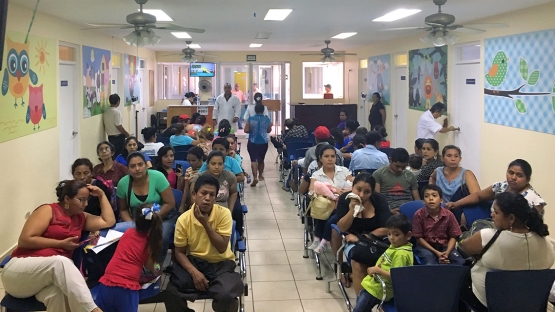After cervical cancer, the second cause of cancer-related deaths among women in Nicaragua is breast cancer. The IAEA has supported the country in strengthening its breast cancer diagnosis services with equipment and training.
Another focus has been improving the early detection and diagnosis of cancer in children. Paediatric —or childhood— cancers are also on the rise in Nicaragua. IAEA support has included organizing workshops at regional health centres not only for doctors and nurses but also for parents who are learning to better recognize early cancer signs in children.
“The mortality rate from paediatric cancer is another indicator of the need to strengthen dedicated cancer control services in low and middle income countries,” said Farid El Haffar, programme officer at the IAEA’s Programme of Action for Cancer Therapy (PACT).
As part of this support, national experts trained over 500 health professionals in the early detection of cervical and paediatric cancer, and on the decentralization of treatment services. In addition, they have helped strengthen community support networks by educating over 250 community leaders and 278 parents of children with cancer on providing support and making sure they don’t give up treatment.
Down to the regions
Many of Nicaragua’s cancer patients are from poor communities with little access to screening and treatment facilities. One of the Ministry of Health’s current priorities is to decentralize services to these remote areas.
While a single radiotherapy facility is sufficient for this country of 6 million, it is important that follow-up treatment be made available at the regional level, Castro said. “Our aim is to have specialists across the country offer follow-up services beyond Managua.” This year, they plan to launch a digital database of all cancer patients to ensure control, continuity and follow-up anywhere in the country.
After the government gave its full support in implementing an integrated cancer control plan in 2006, Nicaragua was selected as the first PACT Model Demonstration Site in Latin America. PACT Model Demonstration Sites are programmes in eight designated IAEA Member States where PACT works with international partners to develop sustainable cancer control projects.
IAEA support in cancer control has been delivered through projects funded by the OPEC Fund for International Development and funds provided by the Government of Spain through PACT.
By the end of 2017, the IAEA —through its technical cooperation programme— is expecting to provide more equipment and training for experts to further strengthen radiotherapy capacities for cancer treatment.
Enhancing cancer management and promoting safe cancer treatment with radiotherapy will be key themes at the IAEA Technical Cooperation Conference taking place from 30 May to 1 June in Vienna.






